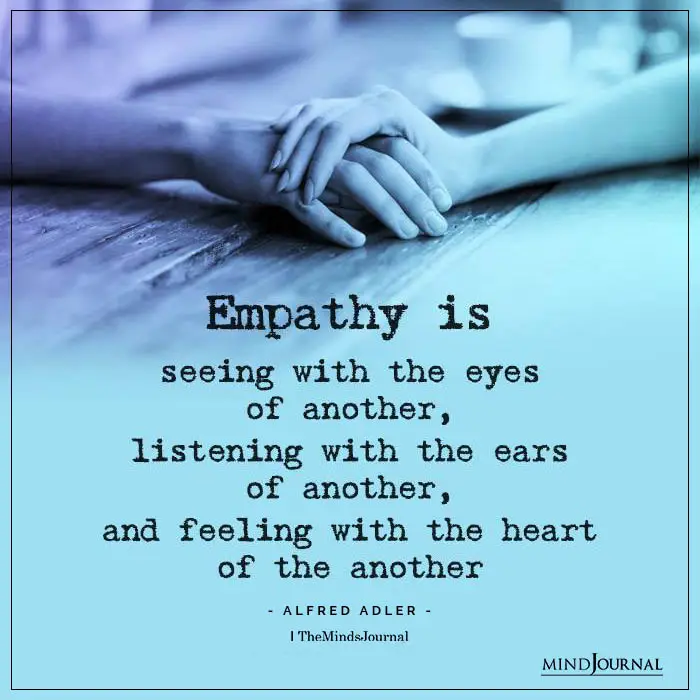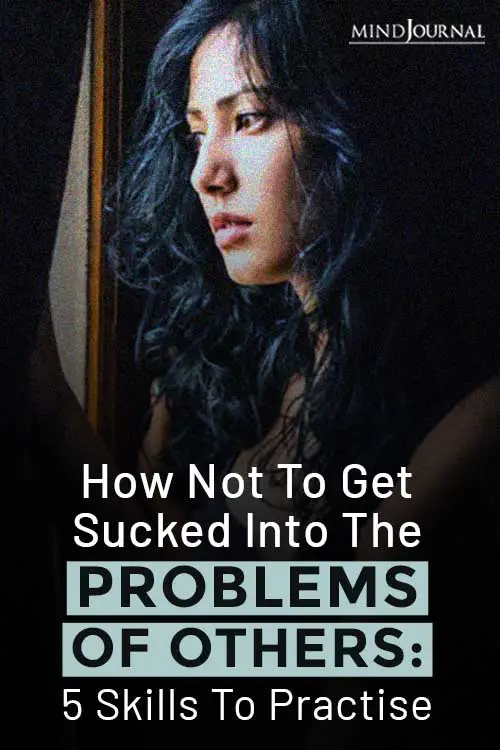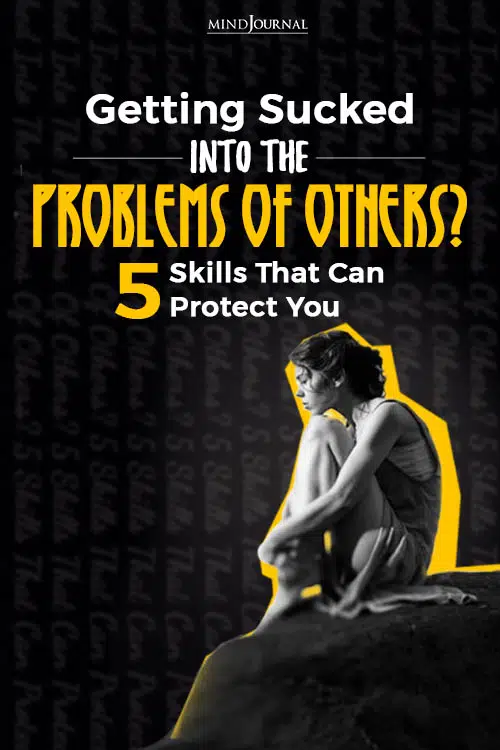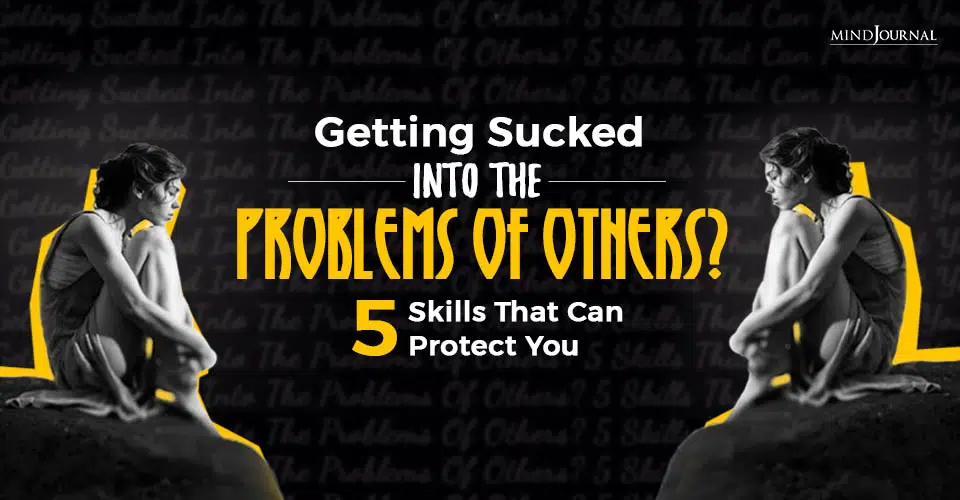Sometimes, you might end up getting sucked into the problems of others, when all you wanted to do was help them deal with it. However, practicing a few skills can help you protect yourself from getting involved in the problems of others, and also help you to help them deal with theirs.
Here’s a question I get asked as a therapist:
How do you listen to people’s problems all day? Don’t you get burned out?
In all honesty, I have worked on my ability to be present and accountable for my clients without taking on their feelings. You can imagine that I see people who are anxious, uncomfortable, lost, sad, frustrated, and traumatized. I hear people’s darkest thoughts, and about the hardest times in their lives. As a compassionate person, it’s only natural to feel their pain too.
However, I have worked on better managing my own emotions around others’ discomfort because I get a lot of practice at it. And I know it’s better for myself and for my clients to remain objective and clear-minded.
The ability to manage yourself in the presence of other peoples’ anxiety and difficult emotions is an ability that can be practiced and strengthened within all of your relationships.
Below are five skills I have learned that have helped me to effectively and respectfully deal with other people’s tough emotions. If you can learn to implement and strengthen these skills, this will help you keep your calm in every relationship in your life, especially the most important ones.
Here Are 5 Skills You Can Practice If You Keep Getting Sucked Into The Problems Of Others
1. Seeing Emotions As a Symptom, Not a Problem To Get Rid Of.
When someone we care about is very anxious, overwhelmed with sadness, or just plain frustrated, it’s natural to see the emotions they are feeling as the problem. This pulls us into action thinking it must be something to be taken care of and resolved as quickly as possible. This is why we so often turn to give advice and trying to “solve” their problems when the people we care about are upset.
However, as I’m sure you’ve come to learn, giving advice to someone that is very anxious, usually isn’t helpful.
What if instead of seeing emotions as the problem we see them as a symptom that is letting the person who is experiencing them know that there is a bigger issue. So, in actuality, their emotions are serving a purpose, and instead of trying to solve their issue, we can get curious about what is going on.
Viewing someone’s emotions as the problem gets us thinking that emotions are bad. When we think of something as bad, we think it must be gotten rid of immediately. On the other hand, thinking of it as a symptom puts us in a mindset of curiosity. And when we’re curious about another person’s emotions, it’s far easier to be validating, understanding, and empathetic, which is what most people experiencing strong, painful emotions really need.
Some curiosity-driven questions look like:
- What is it like for you to be experiencing these emotions?
- What is your best theory for why you are feeling this way?
- Even though you don’t like feeling this way, what do you think this emotion is telling you?
When you shift from problem-thinking to curious-thinking, your mindset becomes driven by interest, which is more helpful for both you and the person who is upset. When someone you care about is having a hard time, try to understand how and why they’re feeling that way. Think about when you’re upset. How is it that you like to be comforted?
Related: 4 Tips To Support Someone Who Is Struggling With Their Mental Health
2. Try to Remember a Time When You Felt the Same Way.
Empathy is when you put yourself in another person’s shoes and try to imagine what it must be like to be in their situation. Empathy is an important skill to implement for many reasons, it’s especially helpful for managing yourself while another person is upset. Instead of just putting yourself in someone else’s shoes, try to remember a time when you wore the same shoes.
Try to remember a time when you struggled in a similar way and with a similar set of difficult emotions. This is a powerful way to appreciate someone else’s struggle because it’s based on your own experiences.
The more you can relate to what they’re going through, the better your odds of being genuinely helpful and supportive, not to mention being less reactive and emotional yourself.

3. Practice Reflective Listening.
When people are struggling emotionally they don’t want you to fix their pain, they want to feel understood. This takes the pressure off of you to think that you need to solve another person’s problem, and gives you permission to merely listen. So, how do we get out of the fixing mindset and start helping people feel understood?
The best way is to practice a technique called Reflective Listening. Reflective Listening means that when someone tells you something, you simply reflect back to them what they said, either literally or with your own understanding.
The value of reflecting back what someone just said is that it helps them feel like you are with them, that you’re connected and understanding. By mirroring another person’s experience you’re giving them something far more valuable than advice — you’re giving them a genuine connection.
Want to know more about how reflective listening can protect you from getting sucked into the problems of others? Check this video out below!
4. Validate Your Own Emotions.
One of the hardest things about being in the presence of an anxious person is the emotions they tend to stir up in us. When we’re deep into a spiral of our own negative emotions, it’s hard to have enough mental and emotional bandwidth to navigate our own mood and that of someone else. This is why we often react to other people’s moods in a way that ultimately isn’t helpful to them, us, or the relationship.
The solution is to get better at noticing and managing ourselves early and we do this through validation. Validation simply means acknowledging our own emotions and reminding ourselves that they’re okay and perfectly reasonable.
If you are in the presence of an anxious person, acknowledge that you’re feeling annoyed and frustrated, remind yourself that it’s okay and natural to feel that way, and then ask yourself what the most helpful way to move forward might be.
Related: 26 Subtle Ways to Show Someone You Care
5. Remember It’s Not Your Responsibility.
A mistake I see people make when trying to deal effectively with other people’s problems is taking responsibility for how the other person feels. In short, because you can’t control how someone feels, you’re not responsible for them. So much unnecessary struggle, conflict, and energy come from a fundamental misunderstanding about what’s really under our control.
It truly amazing how much genuinely helpful energy gets freed up when you remove the burden of excess responsibility from yourself. When you stop expecting to be able to make someone feel better, you can start taking real steps to connect with them in a heartfelt way and become genuinely supportive.
Overall, painful emotions are hard to deal with— both in ourselves and the people we care about. While it’s not possible to “fix” another person’s emotional struggles, there are a handful of practical skills you can learn to help you be more genuinely supportive and helpful.
Skills like self-validation and reflective listening will help you stay calm and effective instead of reactive and impulsive in the face of other people’s problems.
Written By Ilene Strauss Cohen
Originally Appeared On Doctor Ilene










Leave a Reply
You must be logged in to post a comment.